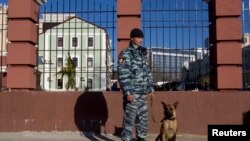The Russian city of Volgograd has a special meaning for most of the Russian population. Historically, when known as Stalingrad, it was the scene of a decisive Soviet victory against Nazi forces in World War II.
Geographically, it is the largest city close to the Black Sea resort of Sochi, venue of the upcoming winter Olympic Games. Volgograd is also the latest target of terrorist bombings from groups believed to be from the volatile North Caucasus region.
Robert Legvold, a Russia expert at Columbia University, says it is difficult to say who is responsible for the bombings of Volgograd’s train station and a trolley bus.
“The attack in October [in Volgograd] by the suicide female bomber was probably associated with a group in Dagestan. But they [Russian authorities] are also concerned about a group that is controlled by a man named Doku Umarov,” said Legvold. “And Umarov this summer, in June 2013, declared that they would organize as many as these kinds of attacks as they could, precisely to disrupt - he said even prevent - the Sochi Games.”
Security is key at Olympics
Russian authorities have spent an estimated $2 billion to shore up security in advance of the Sochi Winter Games. Thousands of security forces and police are patrolling what is known as an “exclusion zone” to protect the games.
Legvold said the Russians apparently have security at the games under control.
“The senior figures within the International Olympic Committee have said they are satisfied that the security is sound. U.S. officials have said that they believe the Russians are able to handle security, even though they - the American officials - have not been as involved as they have been with other Olympics held away from the United States,” said Legvold. “And I think the primary fear is that what we’ve seen in Volgograd will be repeated in areas that are ‘soft targets’ - that is, away from the Sochi Olympics.”
Legvold said previous targets for terrorist groups in Russia included airports, schools, theaters and public transportation.
“And think further, that these are suicide bombers who strap the devastating explosives to their bodies, and it is winter time [when] every Russian is walking around very well padded with outer clothing. It would be very difficult to detect [a bomb] unless you had technical equipment in virtually every spot. ... That seems to me to be nearly impossible.”
Putin’s image at stake
Legvold says the upcoming Winter Olympic Games are essential to President Vladimr Putin’s image.
“He has staked both his personal prestige and even, in a way, his psychological stake in terms of Russian pride, Russian nationalism, showing the outside world that Russia has arrived in every way. I think it’s absolutely central to him, so I can imagine that he is really, really preoccupied with what’s happening now in Volgograd, and getting ready for the Olympics.”
As for future terrorist attacks in advance of the Winter Games, Legvold said: “You’d be a fool to rule them out.”
Geographically, it is the largest city close to the Black Sea resort of Sochi, venue of the upcoming winter Olympic Games. Volgograd is also the latest target of terrorist bombings from groups believed to be from the volatile North Caucasus region.
Robert Legvold, a Russia expert at Columbia University, says it is difficult to say who is responsible for the bombings of Volgograd’s train station and a trolley bus.
“The attack in October [in Volgograd] by the suicide female bomber was probably associated with a group in Dagestan. But they [Russian authorities] are also concerned about a group that is controlled by a man named Doku Umarov,” said Legvold. “And Umarov this summer, in June 2013, declared that they would organize as many as these kinds of attacks as they could, precisely to disrupt - he said even prevent - the Sochi Games.”
Security is key at Olympics
Russian authorities have spent an estimated $2 billion to shore up security in advance of the Sochi Winter Games. Thousands of security forces and police are patrolling what is known as an “exclusion zone” to protect the games.
Legvold said the Russians apparently have security at the games under control.
“The senior figures within the International Olympic Committee have said they are satisfied that the security is sound. U.S. officials have said that they believe the Russians are able to handle security, even though they - the American officials - have not been as involved as they have been with other Olympics held away from the United States,” said Legvold. “And I think the primary fear is that what we’ve seen in Volgograd will be repeated in areas that are ‘soft targets’ - that is, away from the Sochi Olympics.”
Legvold said previous targets for terrorist groups in Russia included airports, schools, theaters and public transportation.
“And think further, that these are suicide bombers who strap the devastating explosives to their bodies, and it is winter time [when] every Russian is walking around very well padded with outer clothing. It would be very difficult to detect [a bomb] unless you had technical equipment in virtually every spot. ... That seems to me to be nearly impossible.”
Putin’s image at stake
Legvold says the upcoming Winter Olympic Games are essential to President Vladimr Putin’s image.
“He has staked both his personal prestige and even, in a way, his psychological stake in terms of Russian pride, Russian nationalism, showing the outside world that Russia has arrived in every way. I think it’s absolutely central to him, so I can imagine that he is really, really preoccupied with what’s happening now in Volgograd, and getting ready for the Olympics.”
As for future terrorist attacks in advance of the Winter Games, Legvold said: “You’d be a fool to rule them out.”











